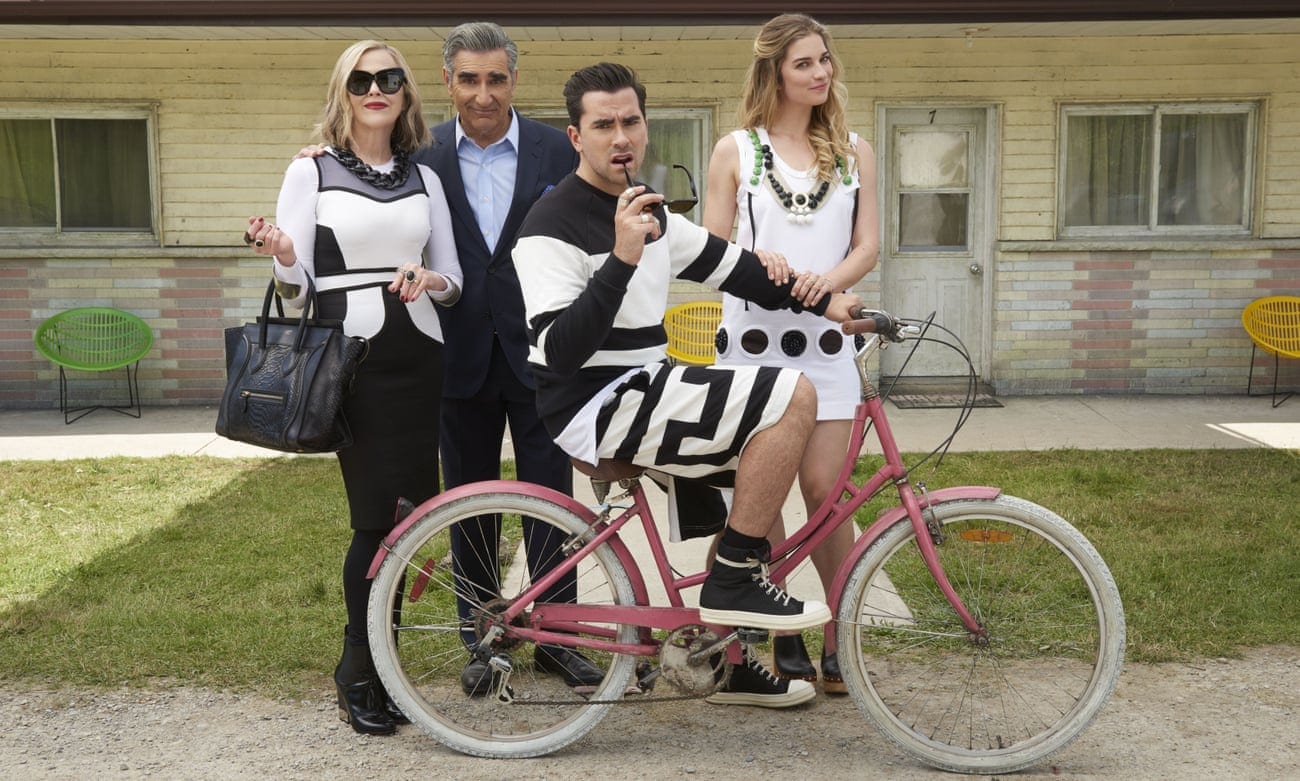Long before we met the once wealthy Rose family, as they were turfed by bailiffs from their mansion and were forced to live in a motel in the backwoods town of Schitt’s Creek they bought for a joke in 1991, they had each lived rich, disparate lives. Father Johnny was a video rental store magnate. Mother Moira had “the longest-running demonic possession on daytime television.” Twentysomething socialite daughter Alexis – “Do I have to remind you of the time that I was taken hostage on David Geffen’s yacht by Somali pirates for a week?” And her insecure, precious, particular older brother David, a pampered New York gallerist.
But, as knows anyone whose heart has been won by this sleeper hit – the Canadian sitcom was hidden away on the obscure Pop cable channel in the US but found a cult following when it moved to Netflix in 2017 – over the six seasons that have followed, their fall from grace led to a life much richer.
Schitt’s Creek, created by Dan Levy who stars as David, and his father, Eugene, who plays patriarch Johnny, could easily have been a one dimensional comedy about a spoilt, selfish family mocking the hicks they rub up against. But Schitt’s Creek swerved that, instead balancing the tender and ridiculous at a time when “good” sitcoms have veered toward the cynical. Schitt’s Creek has the offbeat wacky cultural references of 30 Rock, the colourful, loving smalltown circus of Gilmore Girls and the warmth of The Good Place. And, thanks to the performance of Annie Murphy who copied clips of Lindsay Lohan, the Olsen twins and the Kardashian sisters to develop the vocal fry and gesticulating mannerisms of Alexis, there are regular jolts to early noughties reality TV, too. And the residents of Schitt’s Creek – guileless Twyla at the cafe, beatifically patient mayor’s wife Jocelyn, beleaguered, bored and stony Stevie – never revere the celebrity brood in their midst: instead they tolerate them with an eye roll and welcomed them into their odd little fold (though the family might initially resist). Soon they are fundraising for the local Asbestos Fest with the best of them.
The Rose family do not land with a thud down to earth but slowly, in some of the most intricately-crafted character development in comedy, transform their lot and luck. By the final season, Alexis, once described by Us Weekly magazine as “up for anything”, is thriving as a PR, Johnny is franchising the motel and Moira has half-revived her acting career in The Crows Have Eyes III: The Crowening. David is preparing for his wedding to Patrick, his business partner at Rose Boutique – homophobia simply does not exist in the town of Schitt’s Creek, there are no tricky comings out or moralising lessons, a statement which rings much louder. David’s pansexuality is smartly established early on: “I do drink red wine, but I also drink white wine… And I’ve been known to sample the occasional rosé.”

More unique is how their relationships to each other have bloomed. Once branched around the world (in Alexis’s case, usually awaiting ransom in a Ugandan diamond smuggler’s villa), this group of overgrown children plonked into single beds in adjoining rooms off a highway forces the Roses to root and curl around one another: the portrait of family that emerges is original in how deeply and carefully the script demonstrates their knowledge and consideration of each other.
It’s familiar in every smirk, whinge (“Ew, David!”), sigh, groan – every time the parents humour the fussy David, every time he grinds his jaw in annoyance or jabs his tongue into his cheek to avoid exploding at the hysteria of his mother, every time Moira’s children mock her cherished wall of wigs, or Alexis reveals some wildly inappropriate memory in front of her father – “it’s just a checkpoint. I’ve been through tons of these in Johannesburg. It’s like a drive through, except everyone has a gun.” And it’s in every in-joke – “Alexis looked Chinese as an infant, how many times must I defend myself?” “If this is about those stupid Tamagotchis…” Schitt’s Creek, which ended on Netflix this week, celebrates how daft and full and rich life can be when all you have is one another.


Maurice Saatchi: I used to adore capitalism – then I had lunch with Margaret Thatcher